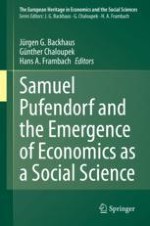2021 | OriginalPaper | Chapter
Pufendorf, Hume and Adam Smith: A Question of Influence
Author : F. L. van Holthoon
Published in: Samuel Pufendorf and the Emergence of Economics as a Social Science
Publisher: Springer International Publishing
Activate our intelligent search to find suitable subject content or patents.
Select sections of text to find matching patents with Artificial Intelligence. powered by
Select sections of text to find additional relevant content using AI-assisted search. powered by
